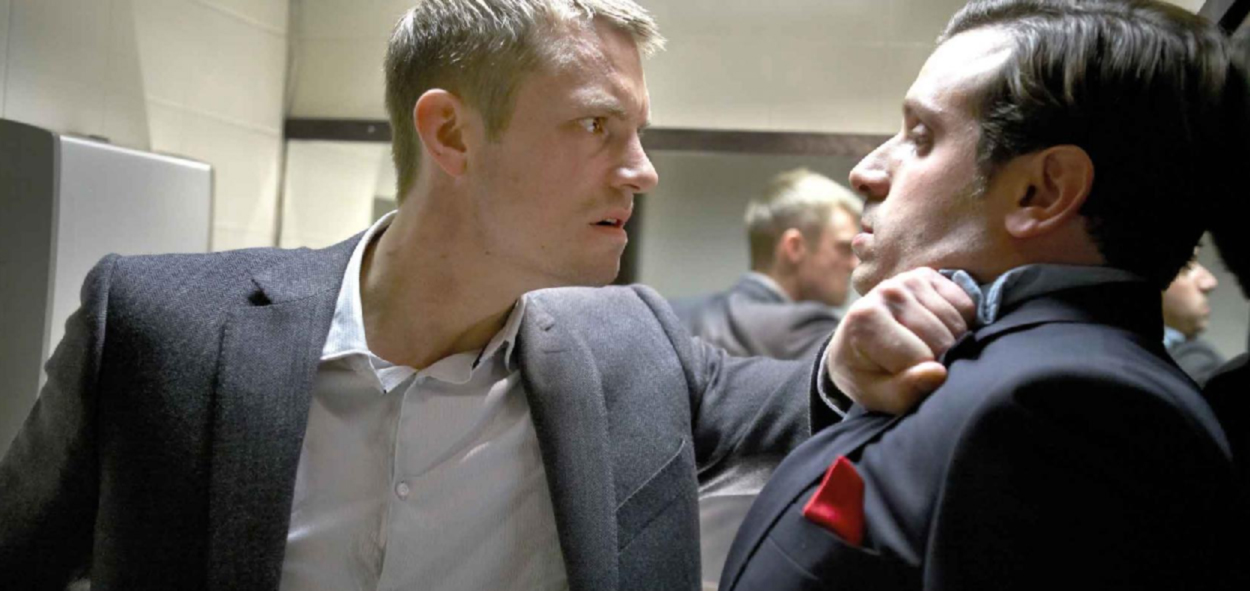
The second instalment of the Swedish crime trilogy picks up three years after the end of the first – JW (Joel Kinnaman), business undergraduate-cum-drug-smuggler, is in prison, having sacrificed himself at the conclusion of the first film to allow his co-conspirator, Jorge (Matias Varela), to escape. Mrado (Dragomir Mrsic), the Serbian hitman last seen being run down by JW and then shot by the very same for good measure, is now wheelchair-bound and in the same prison as JW where, surprise surprise, they have become bffs. Jorge has made use of his time on the outside, setting up his own drug ring, while working the dangerous crime lord Radovan (Dejan Cukic), and JW’s cab driving mate from Easy Money, Mahmoud (Fares Fares), has gotten in over his head with Radovan. JW is getting ready for a day’s release from prison, during which he and a college friend will pitch some trading software JW developed in prison to a venture capitalist. But JW is betrayed by his friend, who pitches the software as his own the day before JW gets out, and hangs him out to dry. Enraged and determined not to go back to prison, JW goes on the lam, busting Mrado from prison when he injures himself to aid his escape. Mrado has a plan – they rob Radovan’s accountant Misha, and go their separate ways. When Jorge’s deal with Radovan goes south and he escapes with one of Radovan’s girls, Nadja (Madeleine Martin), and Mahmoud is told to take him out to pay off his own debt, their paths cross again in a showdown over a bag of money somewhat more fatal than the last.
Family is a much more present theme in this second chapter – while class still plays a huge role, particularly in JW’s painful confrontation with his back-stabbing college “friend”, it takes a backseat to the role of family, and more so the price of crime therein. Mrado is still motivated in everything he does by his daughter, Lovisa (Lea Stojanov), whom he may never see again, and while JW seems to be coping with prison, a tearful phone call with his family who refuse to see or speak to him shows that not at all is well. Jorge’s criminal activities prevent him from seeing his mother just before she dies, and Mahmoud has to steal from his sister’s wedding present money to pay off his debts. The money may come easy but the personal cost is anything but.
The greatest weakness of what is otherwise a well-executed crime thriller is the lack of character development. Where the first chapter tracked JW’s descent into crime, from naïve but cocky undergrad to battered but worldly and learned criminal, Kinnaman has very little to do character-wise in this instalment. Besides lending credibility to his new friendship with Mrado, and revealing his deep-seated rage at the betrayal of his friend, JW becomes simply another player trying to get the cash. The strongest performance by far is Fares as Mahmoud, who communicates to devastating effect the desperation of a trapped man with no other option, who hates what he has become but sees no other way. He despises his father, who was a freedom fighter in “the old country”, but now works for the Swedes – with his father’s name tattooed on his arm, you sense his confliction and his desire for his father’s approval and respect even as he sinks deeper into the underworld.
The film is on firmest ground when it grapples with the multi-racial criminal milieu – Espinosa knows how to mine the clashes and collisions of the different racial groups for maximum effect without reducing any of them to mere profiles, caricatures or stereotypes. Given the anglo-dominated nature of most Scandi-noir, the racial diversity of Easy Money II provides a far more interesting and engaging texture to the film, giving it is a sense of realism that is anything but tokenistic, and furnishing much of the conflict with a very real, volatile tension.
While Espinosa manages to maintain pace and interest throughout the film, one can’t help but feel that the plot itself fails to live up to the promise of the first film. Once we’ve caught up with everyone and what they’ve been up to over the past three years, the film quickly unravels into a very familiar story, as the characters tread the well-worn tracks to attempted redemption and inevitable failure, driven by a disappointingly derivative MacGuffin in the form of a bag of cash. This film is recommended, but only just – it is only Espinosa’s skilful execution and a series of strong performances that manage to elevate such underwhelming material.
